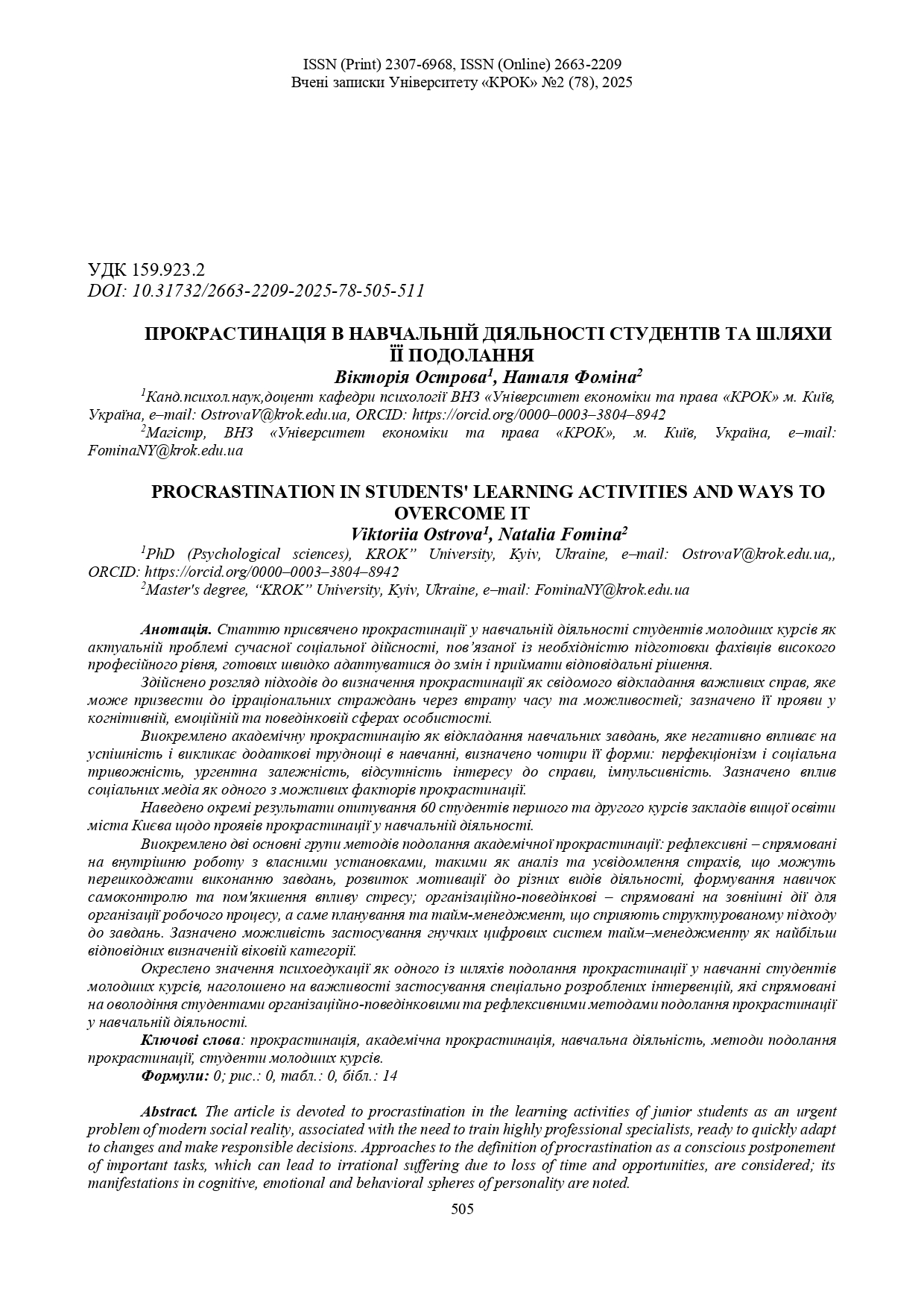PROCRASTINATION IN STUDENTS' LEARNING ACTIVITIES AND WAYS TO OVERCOME IT
DOI:
https://doi.org/10.31732/2663-2209-2025-78-505-511Keywords:
procrastination, academic procrastination, educational activity, methods of overcoming procrastination, junior studentsAbstract
The article is devoted to procrastination in the learning activities of junior students as an urgent problem of modern social reality, associated with the need to train highly professional specialists, ready to quickly adapt to changes and make responsible decisions. Approaches to the definition of procrastination as a conscious postponement of important tasks, which can lead to irrational suffering due to loss of time and opportunities, are considered; its manifestations in cognitive, emotional and behavioral spheres of personality are noted.
Academic procrastination is distinguished as the postponement of educational
tasks, which negatively affects academic performance and causes additional difficulties in learning, and its four forms are identified: perfectionism and social
anxiety, urgency dependence, lack of interest in the case, impulsivity. The influence of social media as one of the possible factors of procrastination is noted.
Some results of a survey of 60 first– and second–year students of Kyiv higher education institutions on the manifestations of procrastination in educational activities are presented.
Two main groups of methods for overcoming academic procrastination are distinguished: reflective – aimed at internal work with one's own attitudes, such as analysis and awareness of fears that may impede the performance of tasks, development of motivation for various types of activities, formation of self–control skills and mitigation of the impact of stress; organizational and behavioral – aimed at external actions for organization of the work process, namely planning and time management. The possibility of using flexible digital time management systems as the most appropriate for a particular age category is noted.
The article outlines the importance of psychoeducation as one of the ways to overcome procrastination in the education of junior students, emphasizes the importance of using specially designed interventions aimed at students' mastery of organizational, behavioral and reflective methods of overcoming procrastination in educational activities.
Downloads
References
Бикова, Д. В. (2010). Прокрастинація як прояв емоційно-орієнтованого та орієнтованого на уникнення стилів копінгу. Психологія поведінки, що опирається. Матеріали II Міжнар. Науково-практ. конф., 194–196.
Грисенко, Н. В. (2017). Особистісні особливості схильних до академічної прокрастинації студентів. Молодий вчений, 11(51), 789–793.
Дворник, М. С. (2018). Прокрастинація в конструюванні особистісного майбутнього : монографія. Інститут соціальної та політичної психології НАПН України. Кропивницький : Імекс–ЛТД. 120.
Журавльова, О. В., & Журавльов, О. А. (2019). Адаптація україномовної версії психодіагностичної методики Pure Procrastination Scale. Теорія і практика сучасної психології, 1(2), 50–53.
Козяр, М. М. (2004). Екстремально-професійна підготовка до діяльності у надзвичайних ситуаціях. Львів: СПОЛОМ, 376.
Луговa, В. М. (2018). Прокрастинація: основні причини, наслідки та шляхи подолання. Актуальні наукові дослідження в сучасному світі. Переяслав Хмельницький, 4(36)-2, 59–65.
Шиліна, А. А., & Євсігнєєва, К. В. (2011). Особливості самоставлення студентів з різним рівнем прокрастинації. Вісник Харківського національного університету імені В. Н. Каразіна. Серія : Психологія. 985(48), 41–45.
Burka, J., & Yuen, L. (1983). Procrastination: Why you do it, what to do about it. Reading, Mass.: Addison Wesley Pob. Co. 227.
John, O. P., & Srivastava, S. (1999). The Big Five trait taxonomy: History, measurement, and theoretical perspectives. Handbook of personality: Theory and research, 2, 102–138.
O’Brien, K., & DeLapp, J. (2018). The impact of social media on procrastination: A systematic review. Computers in Human Behavior, 87, 355–368.
Richardson, M. (2003). Negative emotions and procrastination. Journal of the Psychology of Work and Organizations, 88(5), 678–697.
Steel, P. (2010). Procrastination in academic settings: A review of the literature and recommendation for аuture research. Personality and Social Psychology Review, 14(3), 65–86.
Stelnicki, А. M., Nordstokke, D. W., & Saklofske, D. H. (2015). Who іs the successful university student? An analysis of personal resources. Canadian Journal of Higher Education, 45(2). 214–228.
Wilson, K. G. (2002). Procrastination: A cognitive model. Psychological review, 109(1), 69–89.

Downloads
Published
How to Cite
Issue
Section
License

This work is licensed under a Creative Commons Attribution-NonCommercial 4.0 International License.

